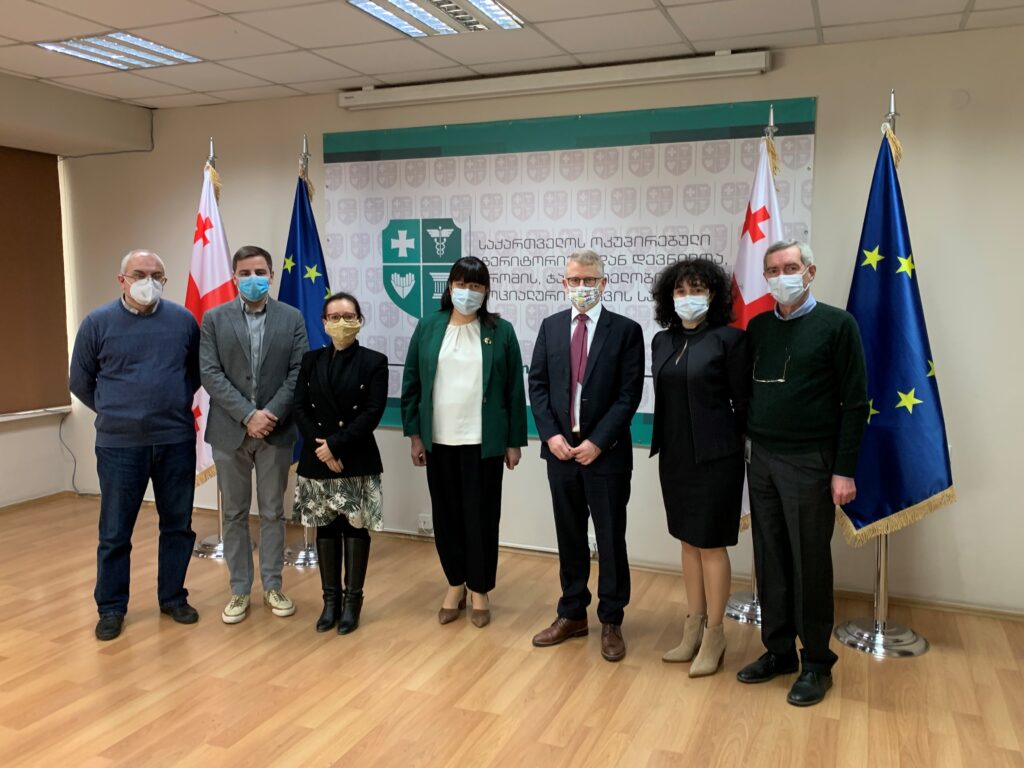Following a long and productive exchange resulting in four projects tackling local antimicrobial resistance (AMR) challenges, Georgia has committed to becoming an ICARS Mission Partner.
In reaction to the announcement, Robert Skov, Scientific Director said:
“It is wonderful to see the strong relationship we have developed with Georgia made official as they take the step to join ICARS as Mission Partners. It has been such a pleasure to work together over the past two years and grow our in-country networks to ensure the smooth implementation of new projects. Visiting the project sites and enthusiastic research teams at the end of last year was extremely motivating, and I look forward to seeing results emerge from these important interventions.”

In addition to Georgia, Zambia and India are also ICARS Mission Partners, working to promote the AMR agenda nationally and in their region, as well as providing valuable in-kind support. All partners bring unique capacity and expertise to support ICARS goal of tackling drug-resistant infections across the One Health Spectrum.
ICARS’ collaboration with Georgia already reaches back to 2020, when we co-developed the first human health intervention in Georgia. The project, which aims to optimise use of antibiotics for Surgical Antibiotic Prophylaxis (SAP), began implementation in 2021 and has already made great progress. By introducing an antimicrobial stewardship programme (ASP) adapted to the context from the WHO toolkit, the project aims to achieve 60% surgical antibiotic prophylaxis compliance within 12 months. In 2021, the first component of the ASP had been launched in three out of ten hospitals, and managers and healthcare professionals were motivated to achieve the goals of the programme. This year, ICARS together with the British Society for Antimicrobial Chemotherapy will develop and launch a MOOC that compliments the project.
In addition, in February 2022, Georgia began implementing a further three projects across the human and animal health sectors.
New projects in Georgia
Strengthening Laboratory Capacity in Georgia using a Maldi-Tof MS platform
This project will establish timely and accurate identification of organisms using a Maldi-Tof platform, which can improve the quality and timeliness of organism identification as well as introducing the rapid antimicrobial susceptibility testing system (RAST) which can provide same day antimicrobial susceptibility testing (AST) results. Introduction of faster methods for identification and AST results will help to provide early targeted antibiotic treatment, with the aim to reduce broad spectrum antibiotic therapy, improve clinical outcomes, and reduce mortality.
Use of Maldi-Tof and Rapid Antimicrobial Susceptibility Testing to manage bloodstream infections
Bloodstream infections (BSIs) are severe infections associated with high morbidity and mortality, thus empirical antibiotic treatment on suspicion of BSIs (i.e., therapy initiated without microbiological identification and susceptibility testing) is the standard procedure. Building on the scope of the above two projects, this project will test the feasibility of using Maldi-tof and rapid antimicrobial susceptibility testing (RAST) systems as part of a stewardship programme.
Reducing the use of antibiotic growth promoters (AGPs) on poultry farms in Georgia
This project is the first attempt to engage poultry farmers in Georgia together with farm veterinarians to demonstrate that eliminating the use of antibiotics as growth promoters and “welcome” antibiotics on broiler farms in Georgia without compromising animal welfare, productivity and farm income.
As our project portfolio grows it is exciting to see complementarity and learning shared across projects as well as growing support from our partners.

